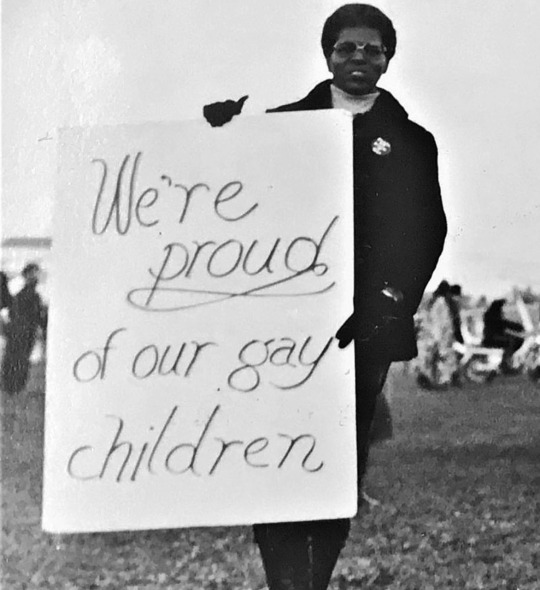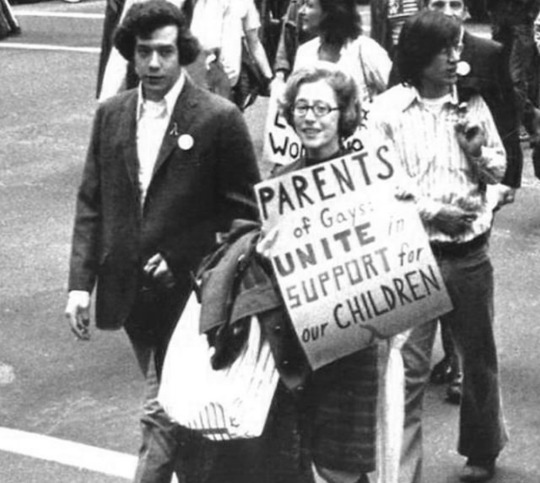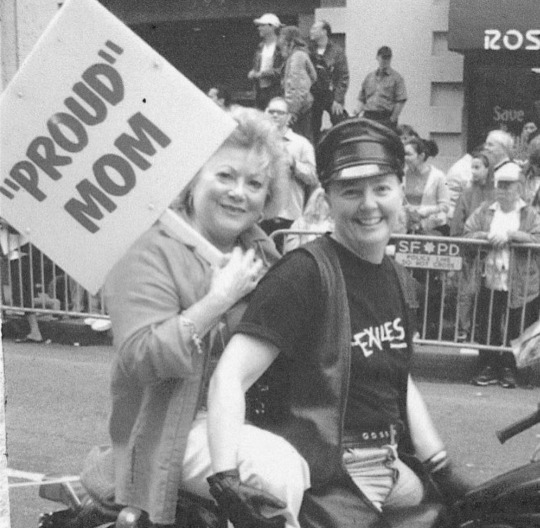Text
my only addition to the proliferation of pride flags is that honestly someone should just start making pride flags that are for the most part inoffensive but then like give the meanings of the stripes like absurdly controversial microcommunity discourse. like "here's my pride flag - the stripes represent all the different types of attraction in the split attraction model, the maroon represents that bisexuality represents being attracted to the two binary genders, the green stands for lesbian bed death, and the stars represent the amount of hypervisibility that trans women use to take up all the space and oppress afab trans people via invisibility and the labrys represents lesbians who are into men (cis men only, obviously). nothing it in represents gay men because they are not oppressed" creating perhaps the most hated object in the queer community and uniting us all
2K notes
·
View notes
Text
sucks following/being around the same online people (who you don't really know, but you know them) for years and years, and whenever you roll across their blog they're still crowdfunding for this or that crisis, still on the perpetual brink of life emergency, that's so integral to who they are because society keeps doing its thing, inescapable, like why would thinks have got any better for this person, realistically? still: it's awful, and you then think back and start wondering "how long have I quasi-known this person anyway, it's been a While", trying to quantify the instability in years - which is daft, because life isn't inevitably resolved over time, it can be a haze of onethingafteranother that doesn't stop, and you have to live within it all the same
2 notes
·
View notes
Text
Me too, its such a wonderful series. I actually got into it through my parents' LP of the Clannad soundtrack, but when I finally saw the real thing it did not disappoint. Absolutely perfect.
It's a shame that Connery is so miscast, because there's a germ of a great idea in the crossover between S2 and S3 and it just doesn't land. I'm also very into the Sherrif's gleeful pantomime villainy
I love that the show always makes five or ten minutes for the Merry Men to just hang about and chill; and I like Robin's vibe, a little bit culty and messianic. And the costumes are gorgeous, and the otherwordliness.
It'd be lovely to see you on the Discord!
(The RoS episodes are currently viewable on youtube!)
Hello, Sapphire & Steel and Robin of Sherwood fandoms.
Do either of us have a Discord server, or a currently active fandom community space?
If the answer is yes, please let me know so I can link to you.
If no: you could do worse than join Old British Telly, a pan-fandom space to support and build communities for tiny-fandoms of telly past.
24 notes
·
View notes
Text
There’s something very holy about the way a song can stop being about whatever it’s about, and start being about who and where you were at the time it meant something to you.
16 notes
·
View notes
Note
i am humbly asking you to explain that orville peck tag. im so intrigued
I’m happy to explain!
For anyone who needs context, I said that being an Orville Peck fan has made me immune to “kink at pride discourse.” I’m not going to get into the nitty-gritty of what kink at pride constitutes. It seems to mean different things to different people. What I am specifically talking about here is the simple existence of things associated with kink (such as harnessses) at pride events.
Orville Peck has a new mask these days. It’s molded to his face, a perfect fit. It emphasizes his eyes and the shape of his nose.

But before this mask, he wore another style: those masks were soft, flexible leather. They did more to obscure the shape of his face. He made them himself. Which makes sense. He’s said before that his mother was a seamstress, among other things, and that he spent two years studying masks and theory associated with them.

"I studied the Jacques Lecoq mask as a performance and, you know, especially in something called the neutral mask which is something that a lot of actors study with and things like that. And, it basically just works off of the idea that sometimes, putting a mask on reveals a lot more than it conceals. I mean, I would actually encourage people to look into it and research it. It's an extremely fascinating art form. It's actually very telling of who people really are."
Jaques Lecoq was a French acting and movement coach. He had a lot of unique techniques, but the one Orville focused on was his work with masks. From his Wikipedia page:
“His training involved an emphasis on masks, starting with the neutral mask. This neutral mask is symmetrical, the brows are soft, and the mouth is made to look ready to perform any action. Lecoq believed that this mask allowed his students to be open when performing and to fully let the world affect their bodies. This is because the mask is made to seem as if it has no past and no previous knowledge of how the world works. This is supposed to allow students to live in a state of unknowing in their performance. The aim was that the neutral mask can aid an awareness of physical mannerisms as they get greatly emphasized to an audience whilst wearing the mask.”
He has also talked openly about what masks mean to him.
“I love masks. I come from a culture where masks are really prevalent—used in ritual and performance. I think that masks enhance a personality and reveal things about a person you would never know otherwise. People get hung up on mine because they think I'm trying to fabricate a mystery or hide, but it's not about any of those things.”
“I don’t think of myself as anonymous at all. It’s what I needed to do to make the kind of art that I wanted to make. This is just an expression of who I am deep in my heart. And it allows me to be completely exposed and sincere. I guess that’s kind of the irony of what I do.”
He has compared his masks to Dolly Parton’s wigs, Johnny Cash’s “Man in Black” persona, and Porter Wagoner’s Nudie Suits.
"I grew up loving country and western stars like Dolly Parton, Johnny Cash and Merle Haggard—people that built a whole legend about themselves, and it wasn't just about music. It was sincerity, but it was also storytelling and performance. So that's what I wanted to do.”
He also makes it clear that the masks are a type of drag.

But in spite of his openness about the masks and their meaning, a lot of early reviews begged to differ.
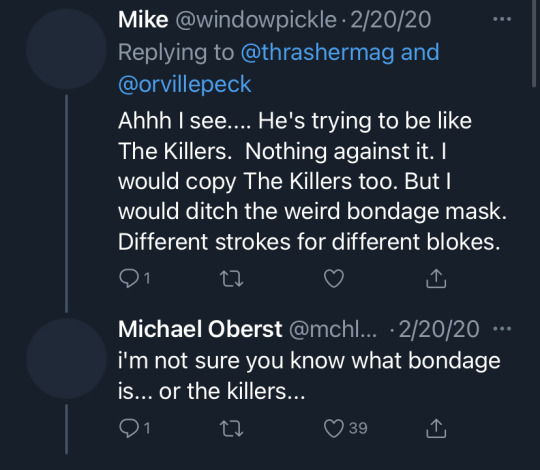
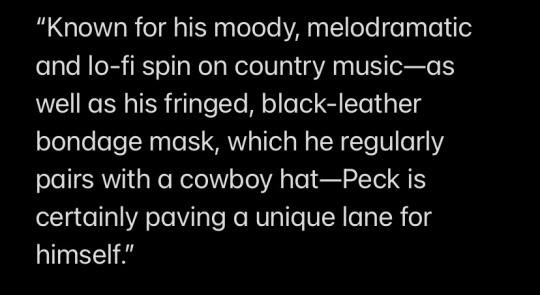

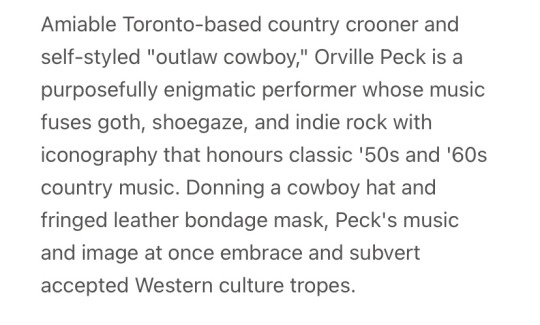
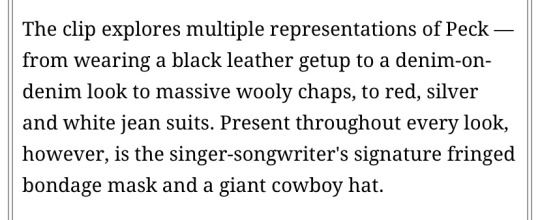


Not EVERY review called his mask a bondage mask. But a lot did. Often right after reminding the reader that Orville Peck is gay.
Reading those early reviews is one of the things that made it click for me that everything queer people do will be sexualized. And not just sexualized, placed under the label of kink.
Orville Peck doesn’t get explicit, but he has also never shied away from expressing his sexuality, or sexuality in general. He talks openly about being gay. The music video for his first single, “Dead of Night,” was filmed in the Chicken Ranch Brothel in Nevada. In “Blush,” a song on his new album, Bronco, he says, “I don’t miss you that much, but, baby, watching you blush, some of us we just gotta ride. Some of us, we gotta saddle up and ride.”
If the mask was meant to be sexual, I think we would know. But he is a queer artist who uses his mask as a display of identity and of vulnerability. That kind of thing is pretty much always going to get sexualized. No pride celebration, no matter how tame, how vanilla, ever stood a chance.
37 notes
·
View notes
Text
I have a statement that I think might piss people off because I’m right. So hear me out.
Cats the Musical isn’t—it isn’t not folk horror.
59 notes
·
View notes
Text
as a trans man, i find it rather odd that so many in this community incessantly attempt to create a wedge between themselves and manhood, thereby “absolving” themselves of its concomitant privileges. it is bioessentialist (and frankly transmisogynist) rhetoric that trans men receive “female socialization” as—if you possess a shred of ideological consistency—this assertion pins trans women as benefactors of “male socialization”, which is patently false.
furthermore, as someone who lives stealth passing in my day to day life offline, i just find it wildly inaccurate to claim that i am not a recipient of male privilege. it reeks of dodging accountability
2K notes
·
View notes
Text
as a trans man, i find it rather odd that so many in this community incessantly attempt to create a wedge between themselves and manhood, thereby “absolving” themselves of its concomitant privileges. it is bioessentialist (and frankly transmisogynist) rhetoric that trans men receive “female socialization” as—if you possess a shred of ideological consistency—this assertion pins trans women as benefactors of “male socialization”, which is patently false.
furthermore, as someone who lives stealth passing in my day to day life offline, i just find it wildly inaccurate to claim that i am not a recipient of male privilege. it reeks of dodging accountability
2K notes
·
View notes
Text
Going to start taking a shot for every "the most progressive thing you can do on environment is: absolutely nothing" take I see; this one is
"what if invasive species were fine?"
by definition, invasive species are a hazard to balanced ecosystems around them - its not just a plant from abroad, it's a plant or creature that will out-compete and decimate an area, with knock on effects throughout the system.
And the thing around native plants and species, specifically, is that they're often rare and vulnerable in their own context - being out-competed by man, by and large. That's why they're important - not some essence of nativeness, but because we're attempting to prevent extinctions.
I am also not a fan of "native species don't matter because rising temperatures don't even mean they'll be best adapted" - accepting climate change as something that's already happened, and so why worry; accepting that extinction is going to occur on an immense level, and so why worry.
I also want to add, with "You don't have to think about what to replace the species with" - generally, nature can do that. Leave a gap and nature will fill it with something - so long as you haven't used a weedkiller (which you shouldn't)
But this post is scattering keywords and sprinkling just enough doubt around to discourage you from a useful and straightforward thing you can do in your space and area. The language around invasive species isn't Great, but this is a practical problem with a tangible solution: you've just got to go out and pull them.
(There's different tactics for different species, and not all of them will be possible for you as an individual to tackle - but some will, and that just means doing the work)
I don't like the way the post talks about a tension between an imagined "unspoilt natural" - and the reality that humans impact their environment; but then goes on to argue that environmentalists should not proactively impact their environment by pulling troublesome plants. This post conceives of working with the landscape as a going backwards rather than as a forwards.
"Oh, the problem is capitalism btw. Our infrastructure and livelihoods depend on creating environments where invasives thrive and natives cannot." - but OP doesn't really explain how this is; sounds satisfying though. I think it's just incorrect. The out-of-placeness of invasive species are those who unluckily found a perfect niche in an unprepared ecosystem.
And also "Individuals can help on a very small scale by planting their yards in an environmentally friendly way but if a highway project and new industrial center is going in down the street… nothing is going to help the local environment except lobbying and supporting conservation organizations" that's not a terrible conclusion, but have you noticed that a highway project has...nothing to do with invasive species? I'm also not wild about people opposing direct action - pulling weeds - with something as passive as "lobbying" or "supporting charity organisations".
the second post raises some interesting questions, but these refer to rewilding. Rewilding is separate to action on invasive species. "What point do we rewild to?" is a conversation for any such rewilding project to have, and it should include both trained ecologists and locals. But invasive species will just wipe out anything its in competition with. There's not some vague xenophobic moralising going on; Giant African Land Snails will demolish native snails, Himalayan Balsam causes floods, Japanese Knotweed make houses unsafe to live in, and the presence of Grey Squirrels means the absence of Red Ones.
& as ever, I'm uncomfy with this vague gesture towards "caring about the environment is actually more racist" at the end. Invasive species are intertwined with colonialism: generally, colonisers bringing some shit to a place they are colonising, or taking something home (often to sell for profit). Its not "ignoring indigenous issues" to feel like the possums (brought in from abroad, endangering New Zealand trees and birds) are a problem, and IMO it's a bit sinister to be throwing this in there.
tl;dr - OP is a call for inaction deploying various strategies to raise a sense of uncertainty and anxiety on the topic, but doesn't seem to understand what an invasive species is. Also, community projects targeting invasive species are a straightforward way to do something useful if your mobility/dexterity is ok.
3 notes
·
View notes
Text
i think that unless you have experienced life while being actually dead broke or near it at least once, its hard to really grasp at how, in many places but in america in particular, ‘having money’ is the access card that allows you to participate, materially, in being fully human. even in non-crisis situations, situations where a paycheck is on the way, you have enough of some kind of food to make it, and you aren’t in any danger of losing shelter, even if you hardly spend any money when you do have it, the state of being completely without money is a state of being hyperaware, constantly, of how much smaller your world is all of a sudden and how many basic aspects of mobility and enrichment are off limits to you. its profoundly psychologically agitating to self worth and well-being even sans the trauma of worse states of deprivation, and i don’t think a lot of people who have lived comfortably without this experience understand that there’s a critical difference between ‘having less money’ and ‘having no money’ when talking about related issues.
46K notes
·
View notes
Link
Americans support recycling. We do too. But although some materials can be effectively recycled and safely made from recycled content, plastics cannot. Plastic recycling does not work and will never work. The United States in 2021 had a dismal recycling rate of about 5 percent for post-consumer plastic waste, down from a high of 9.5 percent in 2014, when the U.S. exported millions of tons of plastic waste to China and counted it as recycled—even though much of it wasn’t.
Recycling in general can be an effective way to reclaim natural material resources. The U.S.’s high recycling rate of paper, 68 percent, proves this point. The problem with recycling plastic lies not with the concept or process but with the material itself.
The first problem is that there are thousands of different plastics, each with its own composition and characteristics. They all include different chemical additives and colorants that cannot be recycled together, making it impossible to sort the trillions of pieces of plastics into separate types for processing. For example, polyethylene terephthalate (PET#1) bottles cannot be recycled with PET#1 clamshells, which are a different PET#1 material, and green PET#1 bottles cannot be recycled with clear PET#1 bottles (which is why South Korea has outlawed colored PET#1 bottles.) High-density polyethylene (HDPE#2), polyvinyl chloride (PVC#3), low-density polyethylene (LDPE#4), polypropylene (PP#5), and polystyrene (PS#6) all must be separated for recycling.
Just one fast-food meal can involve many different types of single-use plastic, including PET#1, HDPE#2, LDPE#4, PP#5, and PS#6 cups, lids, clamshells, trays, bags, and cutlery, which cannot be recycled together. This is one of several reasons why plastic fast-food service items cannot be legitimately claimed as recyclable in the U.S.
Another problem is that the reprocessing of plastic waste—when possible at all—is wasteful. Plastic is flammable, and the risk of fires at plastic-recycling facilities affects neighboring communities—many of which are located in low-income communities or communities of color.
Unlike metal and glass, plastics are not inert. Plastic products can include toxic additives and absorb chemicals, and are generally collected in curbside bins filled with possibly dangerous materials such as plastic pesticide containers. According to a report published by the Canadian government, toxicity risks in recycled plastic prohibit “the vast majority of plastic products and packaging produced” from being recycled into food-grade packaging.
Yet another problem is that plastic recycling is simply not economical. Recycled plastic costs more than new plastic because collecting, sorting, transporting, and reprocessing plastic waste is exorbitantly expensive. The petrochemical industry is rapidly expanding, which will further lower the cost of new plastic.
Despite this stark failure, the plastics industry has waged a decades-long campaign to perpetuate the myth that the material is recyclable. This campaign is reminiscent of the tobacco industry’s efforts to convince smokers that filtered cigarettes are healthier than unfiltered cigarettes.
7K notes
·
View notes
Text
Attempts to critique consumer culture are dogpile magnets nowadays, a sort of compassionate "we can't wholly help our choices in a life and set of systems vastly beyond our control" which then gets popularised as "every consumer choice I make is actually radical"
(girlboss anticapitalism? Its the same energy as "this thing I am doing is feminist because I, a woman, am doing it")
When I decided to get one, I felt strongly about making my own pride flag. Mine is all 2nd hand cloths from the community shop, mostly pillowcases. Making your own pride flag is great. Its a beginner-level project, just rectangles and maths and french seams.
but more important is the feeling of knowing that you can opt out, actually; there's no "late stage capitalism" making you buy cruel stuff - there are other options, and this one feels powerful, the meditative act of making a flag is slow, and laboured, time to reflect on what else you want to make and create.
“China produces more rainbow flags than anyone. My nightmare is there is a factory with nearly slave labor, forced to live within the factory complex and get up every morning and have to churn out more and more rainbow tchotchkes.” He says he didn’t create the rainbow flag in order for others to profit off of “rainbow junk”.
He is horrified by some of the things he has seen. He says, “Walking down Castro Street, I can’t pay my rent, but I see rainbow dildos in the shop windows and rainbow keychains, rainbow rings, rainbow candles and so on.” He said it is similar to when the best music ends up as elevator music. He is gratified that the power of the rainbow caught on as rings, but that power can be diluted by over-commercialization.”
-Gilbert Baker, creator of the Pride Flag
#if you think this take is bad#wait until you learn how negative i feel#about little people selling pride merch#what if our life was not defined around buying things??
26K notes
·
View notes
Text
Part of a professional education is being groomed to be okay with things. Mainstream economics grooms people into believing insane wealth inequality is fine, law students love to pontificate about how eager they’d be to defend Nazis. If you suggest to the professors hey maybe what you’re encouraging us to do isn’t morally okay the way you claim it is they frequently respond in weirdly emotional and hostile ways. I got an A in Ethics for Engineers at my defense contractor / DOE lab feeder school for arguing that child labor in impoverished countries was fine from a utilitarian perspective if the resulting economic benefit outweighed the harm done to the child.
12K notes
·
View notes
Text
The BBC is releasing over 16,000 sound effects for free download
144K notes
·
View notes
Video
LET’S GROOVE! an ode to unsettling dance scenes
28K notes
·
View notes



